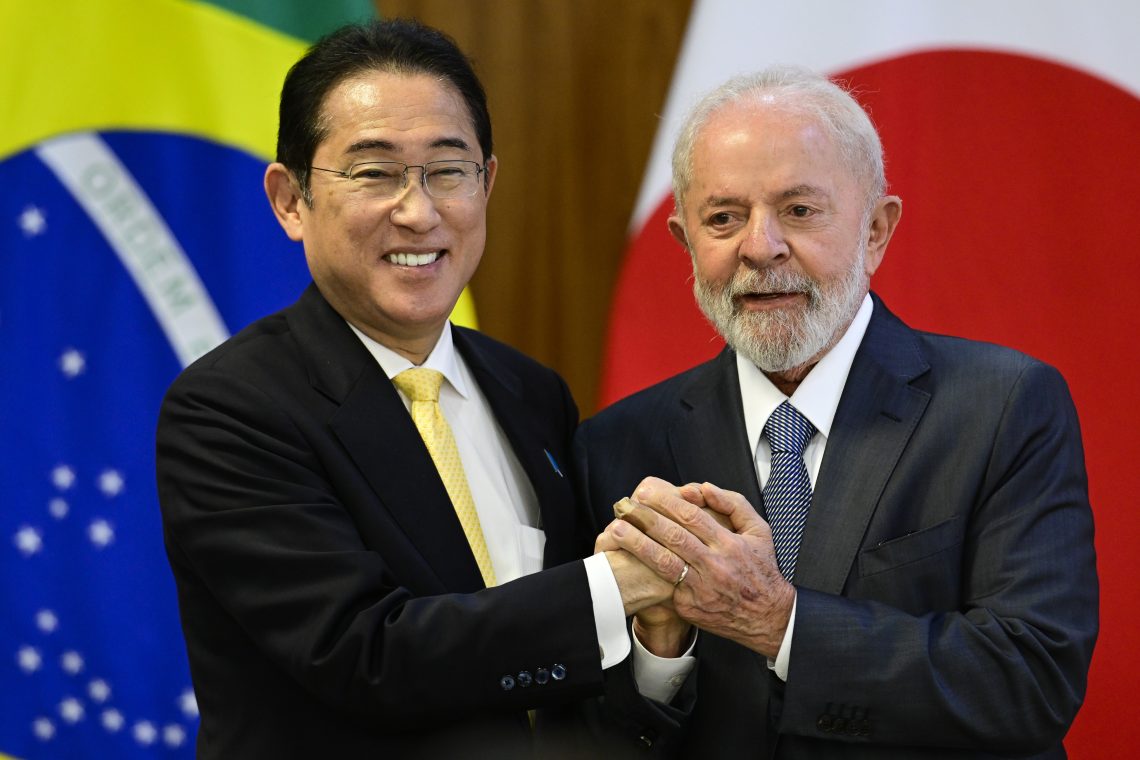Japan’s strategic shift in diplomatic engagement
Japan’s evolving foreign policy is focusing on increased engagement with Latin America and Africa, highlighting a strategic shift in global diplomacy.

In a nutshell
- Japan’s diplomatic, economic presence is growing in Latin America and Africa
- Demographic changes drive Japan’s outreach to overseas communities
- New foreign policy reflects broader engagement and defense priorities
Geography, culture and language determine how a country positions itself in the world at large. In Japan’s case, this positioning has also been shaped by its marginal location, its demographic cohesion and the weight of its history. Although Japan has never been colonized by a foreign power, the archipelago has long kept a wary eye on its powerful neighbor China, and, mindful of its erstwhile imperialist tendencies, on the Pacific.
Following World War II, Japan felt secure under the umbrella of the United States while China remained stuck in self-inflicted backwardness, reducing the need for Tokyo to invest heavily in distant diplomatic relations. Japanese industry spread the increasingly valuable notion of “made in Japan” worldwide. The country became an economic superpower, though it remained a minor player on the diplomatic scene. Until recently, Japan assumed that this state of affairs would continue, but it has now had to adjust to substantial changes in its geopolitical environment.
The Nikkei in Latin America
The annual “Diplomatic Bluebook” issued by the Japanese Foreign Ministry reflects the increasing internationalization of Japanese foreign policy, as do the recent travel destinations of Prime Minister Fumio Kishida and Foreign Minister Yoko Kamikawa. The “Golden Week,” which falls each year at the beginning of May when the parliament is not in session, is the time when cabinet members can travel. This year’s destinations were significant for their geographical and cultural diversity. The prime minister went to Latin America and the foreign minister visited, among other destinations, Madagascar, Ivory Coast and Nigeria.
Latin America seems remote from Japan, but a limited rapprochement with a small number of Latin American countries has occurred within the Asia-Pacific Economic Cooperation forum. Japan is not a country of immigrants or substantial emigration. However, with some 2.3 million Nikkei (a term for Japanese people living abroad), Latin America hosts about 60 percent of the Japanese expatriate community, with Brazil having the most substantial contingent. At a time when India and China increasingly rely on their diasporas to enhance their economic and cultural standing, Japan is looking at its compatriots abroad in a new light.
‘Japan, Inc.,’ as the country’s corporate culture is often called, moves faster than most Japanese politicians and bureaucrats.
There is considerable potential in these expatriate groups, even though Japanese people living abroad are sometimes viewed with suspicion regarding their adherence to traditional Japanese values and modes of behavior. With the demographic sea change of a rapidly shrinking and aging domestic population, vibrant overseas communities may be valued more than in the past. When it comes to discovering and exploiting new economic opportunities, “Japan, Inc.,” as the country’s corporate culture is often called, moves faster than most Japanese politicians and bureaucrats. Notably, since 2011, the number of Japanese companies operating in Latin America has doubled, with Mexico seeing the lion’s share of the growth.
Making substantial inroads into business and trade with Latin America should not be seen as exotic or charitable. Japan, like Germany and South Korea, is highly dependent on functioning global supply chains. Its industry thrives on exports and Japan traditionally produces high external trade surpluses. However, many of the areas where Japanese goods are sold and produced and from where Japan sources its energy and raw materials are regions of endemic or acute geopolitical instability. Companies and consumers focus on price advantages, and in that respect, Latin America is less competitive and culturally alien. Remarkably, Latin America has largely avoided the world wars of the 20th century and is likely to continue that tradition in the current century.
Read more from Asian Affairs expert Urs Schöttli
- Rethinking the Japanese economy
- The new geopolitics of trade in Asia
- Realism overtakes wishful thinking in Japan
- Security implications of South Korea’s election
With Tokyo’s new perspective, Latin America has gained importance for Japan as a market and a source of energy inputs and raw materials. Significantly, initial moves by Japanese foreign policy experts suggest a focus on the Emerging Global Majority, specifically Latin America and Africa, with East Asia and Europe seen as already well-trodden terrain. In the past, Japan focused on institutions and initiatives that involved a seat at the high table of the Western powers, as seen with trilateral meetings of Japan, South Korea and the United States or China, and with the G7. Now, Japan sees itself as an interlocutor with a much wider and more varied world, firstly in the G20 and, if things go according to plan, increasingly with the emerging global majority.
The Nikkei in the Gulf of Guinea region
Going westward for Japan means strengthening its involvement with India and Africa. Japan’s initiative for the Free and Open Indo-Pacific entails enhancing Indo-Japanese cooperation, which has been gaining strength under Indian Prime Minister Narendra Modi. While Japan was previously focused on trans-Pacific issues, trade and relations, it now must consider the entire Indo-Pacific superregion, including the Indian Ocean as a key component. This also requires a new and different look at Africa, which accounts for a large part of the Indian Ocean’s shoreline.
Japanese foreign ministry: Key issues

Traditionally, Africa has been the focus of Japanese development aid, with the main forum being the Tokyo International Conference on African Development, which will hold the next summit in 2025. But as China has made massive strides in its economic and geopolitical presence in Africa, and as Russia has expanded its military presence there, following in the footsteps of the French in West Africa, Tokyo is placing much more emphasis on the geopolitical impact of its presence in Africa. It aims to counter the Chinese strategy, which focuses on securing access to valuable raw materials on the African continent.
New fields of action are being discovered in Africa, with Japan having the advantage of not being burdened by colonial legacies, unlike Europe. An interesting example is the Gulf of Guinea, seen as an economically cohesive region transcending nation-state boundaries drawn by European colonial powers. Japan views this region, including the economic powerhouse of Nigeria, as a promising location for its African strategy take-off, expected in the coming decades.
Decisive turn to values
The overhaul of Japan’s foreign policy comes at a time when two decisive shifts are affecting traditional security attitudes. The first shift concerns the Japanese public’s perception of international relations. For a long time, a clear majority of Japanese people abhorred the idea of their country getting involved in foreign conflicts, taking sides and abandoning a generally pacifist approach to security.
Many Japanese, particularly older people, believe Japan should leave global security duties to the Americans and close the U.S. bases on Japanese soil while maintaining a low-profile self-defense force. They most certainly oppose any military engagement overseas. Some even advocate for Swiss-style neutrality, ignoring that with Japan’s weight, it cannot avoid global responsibilities like a small country might.
Japan’s security environment in the post-war period has never been as challenging as it is today.
Noting the increasing threats caused by a global axis of authoritarian regimes, the two most potent being China and Russia, both neighbors of Japan, the political establishment is turning toward a more value-based foreign presence and engagement. Prime Minister Kishida recently declared: “We need to be more committed to our values and at the same time, we need to remain humble.” According to the Japanese government, Japan’s security environment in the post-war period has never been as challenging as it is today. That is the background for the country’s new commitment to reach 2 percent of gross domestic product on defense spending by 2027. From 2023 to 2028, a total of $270 billion is slated for defense. However, even this substantial increase is insufficient even to counterbalance China’s massive military buildup.
Japan’s security outreach to new areas now contrasts with Chinese President Xi Jinping’s determination to create an alternative global framework to the West. Opposing the traditional values promoted by the West, Beijing aims to strengthen cooperation among autocratic regimes. The recent closeness between Vladimir Putin and Xi Jinping indicates the direction of this move. Recent proclamations between President Putin and North Korean leader Kim Jong-un provide further evidence of this trend.
Japan is reacting to this challenge by moving closer to NATO. In the past, Tokyo saw NATO and its security framework as relevant to North America and Europe but of little interest to an Asian power like Japan. This has changed with the new perception that Japan shares the values upheld and defended by NATO. The war in Ukraine has brought the two sides closer together, with Japan now present at NATO ministerial meetings and participating as an observer at NATO summits. Tokyo is also cooperating with the Organization for Security and Cooperation in Europe (OSCE). That is part of the multilayered approach to diplomacy with Europe, which includes instruments like the Japan-Baltic Cooperation Dialogue.
Scenarios
Possible: Intensified interaction
The first scenario involves Japan intensifying its interactions in security and economic affairs with Europe and Latin America. That will require Tokyo to withstand regional pressure, most intensely from Beijing but also from Seoul. While some values embraced by Japan within its new foreign policy are shared with South Korea, many, rooted in the cultural identity and legacy of the Meiji Restoration, differ, notably regarding the influence of Confucianism.
Japan must take a quantum leap in outlook that traditionalists may not appreciate. While cooperation still has to be institutionalized, the West would welcome such an opening up by Japan. However, the military support provided by Western powers other than the U.S. is unlikely to amount to much in this region and in the Pacific. The occasional visit of a British, French or German warship in the Far East does not have a deterrent effect. Nevertheless, as a signal of solidarity, it may be helpful.
Possible: Supply chain realities balance defense concerns
The second scenario may result from the vital interests of Japanese industry, which depends on functioning supply chains, international trade and business cooperation across boundaries. Japan, Inc. is concerned about the spread of sanctions and the increase of tariffs, most prominently in the case of China.
Tokyo is aware that Beijing sees with utmost suspicion an “Asian NATO” taking shape. While a new emphasis on fundamental values is appreciated by a substantial part of the Japanese voters, there is also concern about being too adversarial when dealing with China. After all, China is the big bully neighbor on a number of issues. Somehow, an accommodation must be found that secures peace and prosperity in the Far East.
This opinion is shared by influential members of the dominant Liberal Democratic Party, traditionally inclined to support a lenient attitude toward China. A prominent advocate of good neighborly relations is the former Prime Minister Yasuo Fukuda (2007-2008). Bearing in mind the uncertainty about the course of U.S. foreign policy after the forthcoming presidential elections, domestic forces cautioning against an overly pro-Western Japanese foreign policy will gain fresh momentum.
For industry-specific scenarios and bespoke geopolitical intelligence, contact us and we will provide you with more information about our advisory services.









